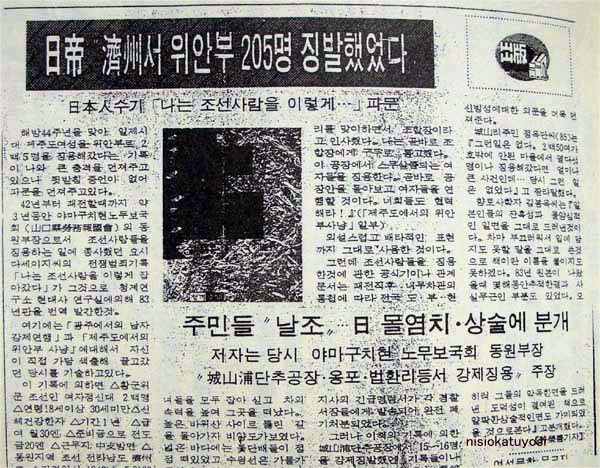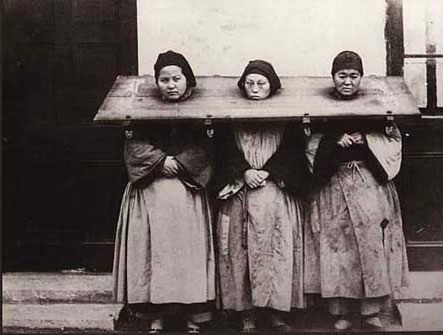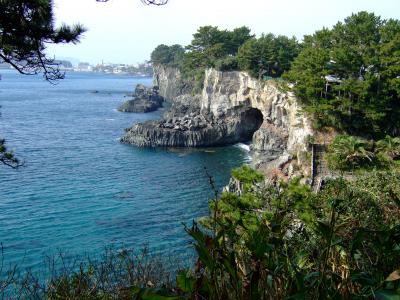Yoshida's False
Confession
In 1983, a Japanese writer, Seiji Yoshida, published a book
entitled "My War Crime - Forcing Transportation of the
Koreans." It was an alleged confession that he had
"transported about 205 Korean women forcibly under the command
of the Japanese military to make them comfort women for
Japanese soldiers." Later, The Asahi Shimbun, an
anti-Japanese newspaper in Japan, took up this greatly and
spread the stories of the "comfort women."
This was the start of the so-called "comfort women." Before
that, there had been no such a story. There was none from
Korea, and none from Japan. Yoshida's story was the start of
everything. Later, it became clear that Yoshida's story had
been all lie. Yoshida himself admitted it. He fabricated the
story to earn money.
Yoshida's
Book Translated into Korean
In 1989, Yoshida's book was translated into Korean. However,
at Jeju island of Korea where Yoshida said to have moved the
women forcibly, there were Korean people who doubted it. The
Jeju Newspaper inquired it and put an article that Yoshida's
story had been a lie. A Japanese historian, Ikuhiko Hata, also
visited and inquired at Jeju island, and proved that Yoshida's
story had been a lie.

The Jeju Newspaper (Aug. 14, 1989) concluded that
there was no evidence nor testimony of
Japanese Army forcefully kidnapped girls.
After that, in front of these
facts Yoshida himself confessed that he had lied. He did not
apologize, but took a "so-what" attitude, saying:
"It gives you no profit to write the truth in a book.
Newspapers also do the same thing, don't they?"
Yoshida was a communist sympathizer. The main strategy of
the Japanese Communist Party is to spread the idea that
Japan was a very bad country. They think it would help them
make Japan a communist country. Under that purpose, they
don't think it is bad to make up lies.
However, there still are people who believe the story of
"forcibly-moved comfort women."
No Forced
Transportation
It is a fact that there were comfort women for the Japanese
military in battle fields. The fact is that the comfort
women were doing a business to earn money from their free
will. There were also Korean traders for the business to
mediate between the military and women. The Korean tradesmen
sometimes forcibly moved women to make them comfort women
for the military. There were even women who earned 10 times
money of a university graduate or 100 times of a soldier.
They could build house in their homeland after 2-3 years of
the job. I read many testimonies of those comfort women.
They all said that they had done the job because they could
have made much money there.
But after the Korean translation of Yoshida's book was
published, suddenly appeared in Korea were the women who
said, "I was forcibly moved to become a comfort woman for
Japanese soldiers. The Japanese government, compensate!"
There was no such a woman before that though, they suddenly
appeared at TV news and appealed the "oppression" of the
Japanese military, crying with tears. I saw a Korean woman
who said, " I am evidence of the oppression of the Japanese
militaty!" Her face was projected largely on the TV screen.
Among knowledgeable persons, she was a famous woman as
changing testimonies often.
In 1993, the Japanese government had actual hearings from 16
ex-comfort women and inquired other 10 ex-comfort women.
Among these 26, there were 8 who testified to have been
forcibly moved. But 2 of these had inconsistency in their
testimonies and could not be trusted. And other 4 were
judged by a Korean group also to be difficult to inquire
because of the inconsistency. The rest 2 were the women who
worked merely at red-light district, not at battle field.
There were only comfort women working to earn money.
Japanese
Government's Bad Correspondence
If the story ended here, it would have been better. But the
Japanese government's correspondence after that was not
good. The Japanese politicians so easily apologized to the
Korean government to calm them down.
Before that, the Korean government offered, "We would not
require the compensation of money. So, please make that
there were the forced transportations." The Japanese
politicians said, "We did not find any evidence of the
forced transportations; however, for the sake of the Korean
government, let us make on this occasion that there were the
forced transportations." That was how the Japanese
government did the impolitic apologizing interview. Later,
world people started to look at Japan as a country which had
committed big sex crime.
A Japanese politician who had been in charge of making the
draft of the apologizing interview, later said, "We had an
agreement with the Korean government that with this
interview, both of us would make past issues all settled and
would intend for the future. But seeing that today's Korean
government is saying about compensation for the past, I am
really disappointed."
The same thing can be said to the Japan-Republic of
Korea Basic Relations Treaty concluded in 1965.
Japan and Korea agreed that with this treaty, all past
issues had been settled and that Korea would not require any
compensation for the past anymore. But Korean presidents
after that has ever required compensation from Japan
repeatedly, as if they don't know the treaty.
Truth of
Korea's Annexation to Japan
Where did this Korean nature come from? It came from their
history.
At the beginning of the 20th century, Yi Dinasty Korea was
in the state of bankruptcy. Russia was aiming to take Korea.
If Korea became a part of Russia, the next target was Japan.
So, Japan annexed Korea in 1910 to make it a strong country
not being invaded by Russia. The annexation was done with
the agreements of the great world powers in those days. In
Korea were also the powers to push on with the annexation.
Japan made schools, factories, hospitals, and all the other
institutions in Korea to modernize and rebuild it. Korea,
which was said to be one of the poorest countries in the
world, became much modernized in a short time. Japan poured
huge money and manpower into Korea. Seoul, which was said to
be one of the uncleanest cities of the world, became a
modernized clean city.
The Korean public had not been able to read and write, but
they became able to read and write. The Hangul script became
the letters of the Korean public in the period of the
Japanese rule on Korea. At schools, Korean pupils and
Japanese pupils learned together, under Korean and Japanese
teachers.
At companies, Korean and Japanese people worked together,
sometimes Japanese men working under Korean superiors. There
were even high-rank Korean officers in the Japanese
military, using their Korean names. A Korean writer,
Seon-hwa Oh, interviewed with Korean people and Japanese
people who had actually lived in Korea in the time of the
Japanese annexation (1910-1945), and published a book in
Japan. These people all testified that the Japanese and
Koreans had "worked together" generally "friendly" to make
Korea a strong modernized country.
At the time of the annexation, Japan liberated all Korean
slaves and made all of them equal people. Before that, 43
percent of the Koreans had been slaves and treated as the
same as beasts.

Korean slaves. Japan liberated
them and made all people equal.
Japan released them and made all
people equal. The slaves appreciated Japan. But there were
people who felt bitter about it. Yangban, who were
prerogative government officials, hated it. One of the
Yangban officials was Syngman Rhee, who later became the
first president of Korea.
How
Korea's Anti-Japanese Policy Began
In 1945, Japan was beaten at the Pacific War and left Korea.
Instead, the one who came to Korea was Syngman Rhee. The USA
brought him back from Hawaii to Korea, and made him the
first president of Korea. Rhee was a Korean independence
activist and was in Hawaii.
Rhee had experienced the stay in Korea in the time of the
annexation to Japan for only one and a half years, because
after being suspected as a terrorist at the attempted
assassination of the Japanese director of Govenor-General of
Korea, he escaped to the USA. Rhee was a violent
anti-Japanese person. Why did the USA make him the first
president? According to a book of Wansup Kim, a Korean
writer, published in Japan, the USA in those days thought
that it was a wise policy to make a hostile relationship
between Korea and Japan to suppress Japan.
President Rhee banished all pro-Japanese people from all
official posts and schools, and began violent anti-Japanese
education at every school, teaching that Japan took many
good things of Korea and Japan was a terrible country. He
also gave financial support to anti-Japanese activists, even
when they are giving false testimonies. Every anti-Japanese
policy was born in his reign. There was no freedom to tell
the truth. Any pro-Japanese persons could not live in Korea.
Anti-Japanese was the only way to live in Korea.
Even Jeong-hui Pak, the 5-9th president of Korea, made
anti-Japanese education thorough. Today's president Geun-Hye
Pak(2013-), a daughter of Jeong-hui Pak, also grew up in
this education. She believes that Japan did very bad things
to Korea in the annexation time, and does many anti-Japanese
speeches and actions from the beginning of her presidency.
This is a result of that twisted education of Korea.
We are sad that the Koreans still can't get out of this
false historical viewpoint. Anti-Japanese education is not
good for the Koreans and Korean future. It is a
pre-modernized aspect of Korea. If they continue it, they
would lose the blessings of God. We need to pray that Korea
may notice it, and become a true modernized country.
|
![]() English 한
국어
English 한
국어